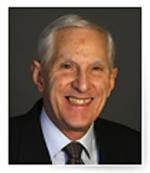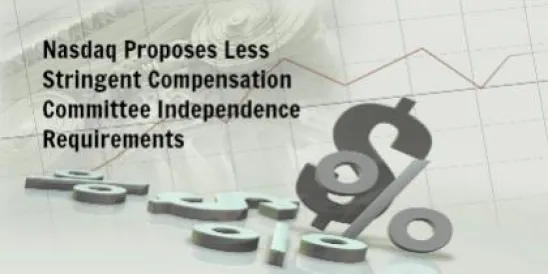On November 26, 2013, the Nasdaq Stock Market filed a proposal with the Securities and Exchange Commission to amend its compensation committee independence rule to eliminate the provision which prohibits members of a compensation committee from receiving any consulting, advisory or other compensatory fees from a company and its subsidiaries (other than fees for board and committee service and certain retirement plan payments). In its place, Nasdaq would require that a board consider such compensation as a relevant factor in determining the independence of compensation committee members. The compensation committee independence rule, which was adopted in January 2013, is set to take effect for the upcoming proxy season, and Nasdaq has proposed that the amendment to the rule be effective for the upcoming proxy season as well. The proposed rule amendment can be viewed here.
Background
As required by the Dodd-Frank Wall Street Reform and Consumer Protection Act of 2010, and Rule 10C-1 under the Securities Exchange Act of 1934, Nasdaq amended its listing rules relating to compensation committee composition, responsibilities and authority earlier this year. Rule 10C-1 required Nasdaq to consider, in determining independence requirements for compensation committee members, certain relevant factors, including the "source of compensation of a member of the board of directors of an issuer, including any consulting, advisory or other compensatory fee paid by the issuer to such member of the board of directors." Following consideration of this factor, Nasdaq adopted a prohibition on the receipt of compensatory fees by compensation committee members, which is the same standard applicable to audit committee members under Nasdaq's listing rules and Rule 10A-3 under the Exchange Act. Notably, the New York Stock Exchange took a more lenient approach and required the receipt of compensatory fees only be considered as a relevant factor in making compensation committee independence determinations.
Although Nasdaq had received limited comment on the prohibition during the rulemaking process, subsequent to adoption the exchange received feedback from issuers and others that the restriction was too burdensome in some instances. As an example, Nasdaq identified banking and energy as industries where it is common for directors to do de minimis amounts of business with a company, which would render such directors ineligible to serve on the compensation committee.
The Proposed Rule Amendment
Under the proposed amendment, the prohibition on the receipt of compensatory fees would be eliminated from the rule. Nasdaq proposes instead that in affirmatively determining the independence of any director who will serve on the compensation committee, a company's board must consider the source of compensation of the director, including any consulting, advisory or other compensatory fee paid by the company to the director. When considering the sources of a director's compensation in determining independence for purposes of compensation committee service, the proposed amended rule states that the board should consider whether the director receives compensation from any person or entity that would impair the director's ability to make independent judgments about the company's executive compensation. Nasdaq also proposes to remove the exception in the current rule that states that compensatory fees do not include: (i) fees received as a member of the compensation committee, the board of directors or any other board committee; or (ii) the receipt of fixed amounts of compensation under a retirement plan (including deferred compensation) for prior service with the company (provided that such compensation is not contingent in any way on continued service). As a result, boards should consider such fees, in aggregate with all other sources of compensation of the director, to determine whether such compensation would impair the director's judgment as a member of the compensation committee. These changes bring the Nasdaq compensation committee independence rule in line with the rules of the NYSE and other exchanges.
The proposed rule amendment does not eliminate the requirement that members of the compensation committee be "Independent Directors." The definition of Independent Director excludes any director who: (i) accepted any compensation from the company in excess of $120,000 during any period of 12 consecutive months within the prior three years; or (ii) is a partner in, or a controlling shareholder or an executive officer of, any organization to which the company made, or from which the company received, payments for property or services in the current or any of the past three fiscal years that exceed 5% of the recipient's consolidated gross revenues for that year, or $200,000, whichever is more.
The proposed rule amendments also contain other minor changes, including a clarification of the standard a board must use when considering the effect of certain affiliate relationships on compensation committee member independence, which standard would track the NYSE rule.
The proposed rule amendment is subject to a 21-day comment period. A company is required to comply with the compensation committee independence rule by the earlier of its first annual meeting after January 15, 2014, or October 31, 2014.





 />i
/>i

